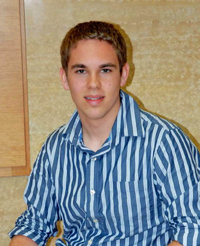 |
Caleb Schmid |
Established in 2001, the BRIN program was created to expose students to serious biomedical research, build a statewide biomedical research infrastructure between undergraduate and graduate institutions and to strengthen each undergraduate institution’s infrastructure and increase its capacity to conduct cutting-edge biomedical and behavioral research.
Today, we meet Caleb Schmid, one of the new BRIN scholars on campus.
What should we know about you?
I am currently a junior in the bioinformatics program at the University of Nebraska at Omaha and I am minoring in chemistry, computer science and mathematics. My hometown is Grand Island. The decision to attend UNO was inspired by two main things — the very unique program of bioinformatics and the Walter Scott, Jr. Scholarship, which provides full tuition and housing. My parents have been a major influence in my life, and they have always encouraged me to do my best and pursue my interests. Since my mother is a dietician, I became interested in health and the wonders of biology at an early age, and this interest has really shaped my development as a scientist.
What are your career goals?
My career goals have centered on going to medical school for many years now, but since my involvement in research, a spark of curiosity has been triggered within me. Lately, I have begun to shift toward the M.D./Ph.D. program.
How did you become interested in science?
An additional influence on my interest in science was the movie Jurassic Park. This originally got me interested in biology in general and genetics specifically. It may seem silly, but as a kid, I wanted to become a world-renowned paleontologist/geneticist that accomplished what Jurassic Park suggested. Eventually, this gave way to interest in genetics research.
What do you hope the BRIN program will do for you?
I hope that the BRIN program will aid me in my career goals, and provide a path to a successful career in research. It has already given me a window into the interesting and exciting world of scientific research. In the Biochemistry and Molecular Biology Department, I have enjoyed learning procedures and applications that I only read about in books previously.
How do you see science evolving over the next 20 years?
In 20 years, I see the scientific world, especially the medical field, diversifying. The field of genetic therapies will eventually provide many new advances in health that will help many people live much longer and more meaningful lives. I hope that I can be on the forefront of these therapies and provide patients with the care they need to overcome their illnesses and lead healthy lives.